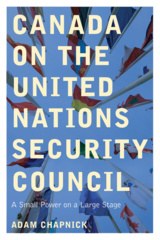
The Nuclear North
Histories of Canada in the Atomic Age
By virtue of resources and technologies Canada is a nuclear nation. But the country does not have the ultimate symbol of nuclear power – a weapons program of its own. Since the first atomic weapon was detonated in 1945, Canadians have debated not only the role of nuclear power in their uranium-rich land but also their country’s role in a nuclear world.
The Nuclear North investigates critical questions in these ongoing debates. Should Canada belong to international alliances that depend on the threat of using nuclear weapons for their own security? Should Canadian-produced nuclear technologies be sold on the export market to potential proliferators? Does the country’s championing of arms control and disarmament on the global stage matter? What about the domestic costs of nuclear technologies and atomic research, including their impact on local communities and the environment?
The contributors to this important collection explore Canada’s relationship with nuclear weapons and other nuclear technologies over the course of the Cold War and beyond. They consider how the atomic age has shaped Canadian policies at home and abroad, and in doing so engage in much larger debates about national identity, contradictions at the heart of the country’s Cold War foreign policy, and Canada’s place in the international order.
Scholars and students of Canadian history and foreign policy – in particular those interested in topics related to the Cold War, security studies, and nuclear policy – will find this work indispensable.
This superb book brilliantly links the domestic to the global and brings together Canadian politics, trade, science, medicine, and the environment. The Nuclear North provides many new insights and is simply a pleasure to read.
This impressive and attractive volume’s insights concerning nuclear weapons and nuclear energy in post-war Canada blend political, military, intellectual, and economic history to deliver an accounting of how the atom and its children affected generations of policy makers, pundits, and the public.
Susan Colbourn is a post-doctoral fellow in international security studies at Yale University. Her research has also appeared in Cold War History and the International History Review, among other publications. Timothy Andrews Sayle is an assistant professor of history and director of the International Relations Program at the University of Toronto. He is the author of Enduring Alliance: A History of NATO and the Postwar Global Order.
Contributors: Jack Cunningham, Katie Davis, Ryan Dean, Se Young Jang, P. Whitney Lackenbauer, Asa McKercher, Michael D. Stevenson, and Matthew S. Wiseman
Foreword / Robert Bothwell
Introduction: Nuclear if Necessary, but Not Necessarily Nuclear / Susan Colbourn
Part 1: A Seat at the Table
1 Very Close Together: Balancing Canadian Interests on Atomic Energy Control, 1945–46 / Katie Davis
2 “We Do Not Wish to Be Obstructionist”: How Canada Took and Kept a Seat on NATO’s Nuclear Planning Group / Timothy Andrews Sayle
Part 2: Political Powderkegs
3 Howard Green, Disarmament, and Canadian-American Defence Relations, 1959–63: "A Queer, Confused World" / Michael D. Stevenson
4 Neutralism, Nationalism, and Nukes, Oh My! Revisiting Peacemaker or Powder-Monkey and Canadian Strategy in the Nuclear Age / Asa McKercher
5 The Road to Scarborough: Lester Pearson and Nuclear Weapons, 1954–63 / Jack Cunningham
Part 3: In Search of Nuclear Tasks at Home and Abroad
6 Who’s Going to Invade Arctic Canada, Anyway? Debating the Acquisition of the Nuclear Submarine in the 1980s / Susan Colbourn
7 “Baptism by Fire”: Canadian Soldiers and Radiation Exposure at Nevada and Maralinga / Matthew S. Wiseman
Part 4: Importing by Accident, Exporting by Design
8 A Northern Nuclear Nightmare? Operation Morning Light and the Recovery of Cosmos 954 in the Northwest Territories, 1978 / Ryan Dean and P. Whitney Lackenbauer
9 Strengthening Nuclear Safeguards: The Transformation of Canada’s Nuclear Policy towards Argentina and South Korea after India's 1974 Nuclear Test / Se Young Jang
Conclusion: Nuclear Victorians / Timothy Andrews Sayle
Index













